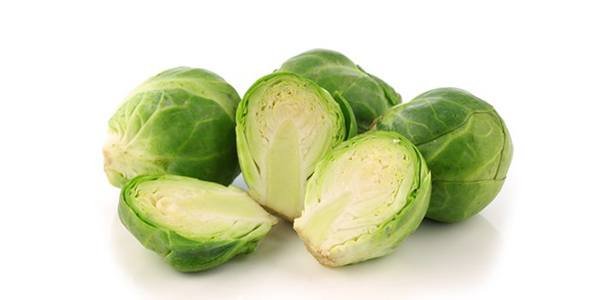Brussels sprouts

Brussels sprouts were obtained from the leaves of white cabbage by vegetable growers in Belgium, from where it was distributed to France, Germany and the Netherlands. Carl Linnaeus was the first to scientifically describe this type of cabbage and called it Brussels sprouts in honor of the Belgian farmers from the city of Brussels. This vegetable is grown mainly in Western Europe, especially in Great Britain, USA and Canada.
The light green cabbage cobs found on the stem of the plant are used for food. Their taste is sweet and very slightly resembles the walnut, and does not resemble that of the common or white cabbage.
The most suitable for consumption and for preparing various dishes or salads from them are the bright green and small cabbage heads, as the large ones can be bitter.
Nutritional value of 100 grams of Brussels sprouts
- Proteins – 4.8 grams;
- Fats – 0.3 grams;
- Carbohydrates – 3.1 grams;< /li>
- Mineral salts – 1.3 grams;
- Water – 86 grams;
- Energy value – 43 kilocalories.
Because the energy value of 100 grams of raw Brussels sprouts is only 43 kilocalories, and frozen – 36, and therefore it can be used by all people, even those who are overweight.
Beneficial properties
Brussels sprouts are rich in folic acid, contain a large amount of high-quality and easily digestible proteins, vegetable fiber, iron, potassium, magnesium, phosphorus, as well as B vitamins and provitamin A.
And vitamin C in this vegetable is 2-3 times more than in other types of cabbage. This makes it an ideal food for dealing with chronic fatigue and for strengthening immunity.
Brussels sprouts have a very delicate flavor and when steamed they are very tender and pleasant. Before preparing this vegetable, chefs advise removing the stems to avoid its bitter taste when consumed.
Brussels sprouts do not contain sodium and cholesterol and are a low-calorie food that has anti-carcinogenic properties, reduces the risk of the occurrence and development of cancers and those of the cardiovascular system – coronary insufficiency and hypertension.
Increases the body’s resistance to infectious diseases, maintains the good condition of the walls of blood vessels. The consumption of this type of cabbage positively affects the nervous and endocrine system and the liver.
Pregnant women are recommended to include in their daily serving of Brussels sprouts as a source of folic acid. This substance is necessary for the proper development of the nervous system and reduces the risk of birth defects in children.
The high content of vitamin C in this vegetable helps young mothers to preserve and maintain their facial tan.
It is recommended that people who have undergone surgery include Brussels sprouts in their daily menu, as its are a source of folacin, which stimulates the formation of red blood cells – erythrocytes.
The juice of this type of cabbage is recommended to drink for the prevention and treatment of cancer, especially for neoplasms of the mammary glands, rectum and cervix, for anemia and constipation, as well as for ischemic heart disease, diabetes , insomnia, colds of the upper respiratory tract, bronchitis, asthma and tuberculosis.
When a person consumes Brussels sprouts together with carrots, lettuce and green bean juice, he acquires a combination of elements that improve and restore pancreatic function.



